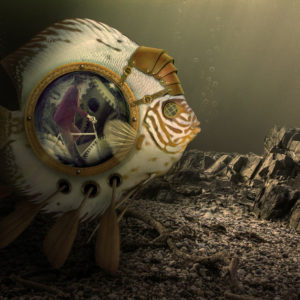Intuition and Sensory Types
Sensory types are by no means incapable of intuition…they just tend to trust it less. Which means that they use it less, and by so doing fail to develop it. Nevertheless, there are numerous instances in which Sensors have received a sudden burst of thought that turned out to be essential to survival (their own or someone else’s) or resulted in an astonishing advancement. It may be that even though lesser intuitions are set aside, healthy Sensors have learned not to ignore their strongest intuitions. When they come, they act on them immediately, and reap the reward.
Intuitive or Introspective?
In order to demystify Intuition, Keirsey named this category Introspection. His idea was that while Sensory types are looking at the outside world, Introspectors are looking within. The concept is a strong one, and useful for examining the aspects of the types. Most personality psychologists continue to use Intuitive rather than Introspective to describe the category, often framing it iNtuition to remind people it is associated with the letter N, and not I—which represents Introversion.
Imaginativity
To the Intuitive, life is full of endless wonder and possibility. This is because they see life through a child’s eyes, in a sense. Though their behavior may bend to fit the world in which they live, the heart and mind of an Intuitive are still tapped into that realm of make-believe and magic that we call the imagination. And they retreat to it whenever they get the chance. While others are out interacting with the world and physical objects, Intuitives are in their heads, conceiving of the future, working out a problem, or speculating about relationships. Imagination is a powerful tool, and one could argue that it is the main thing that separates humans from other animals; plus tools and civilization, all of which rely on imagination to some extent.
Self-understanding
To be in touch with our emotions and motivations, to accept our limitations and embrace our strengths, is to possess great self-understanding. Many people are afraid to look too far within because of the potential demons they may find, unpleasant truths they may confront, or painful memories they may cause to resurface. A person strong in self-understanding is not afraid to face these things. They systematically deal with their own weaknesses and baggage, putting themselves in a position to help others with greater clarity and empathy.
 Associativity
Associativity
Intuitives are good at finding connections between things, people, circumstances, and events. They excel at categorizing and diagnosing. They can see patterns and use inductive reasoning with surprising accuracy to arrive at a conclusion. Able to draw upon metaphor, they can use analogy to reveal hidden truths about a subject while sliding past the biases of the observer. Many Intuitives strong in Associativity are drawn to art in some form, and they use it to convey powerful insights about people and the world they live in.
Unorthodoxy
Intuitives tend to have trouble observing social norms. Not that they have anything against getting along or are trying to be difficult, they just believe that there are always better ways of doing things than the ones people usually use. And in truth, many of them don’t even realize certain norms exist. This is because while Sensors are busy trying to fit in, Intuitives are busy trying to figure things out: a mechanism, a design flaw, or just their own emotions. Eventually, they start to realize that they are different, and are being labeled as strange, geeky, or whatever else, but the fact is that popularity and social standing aren’t that important to them compared to the workings of the universe. Besides, they don’t want to be like everyone else. They like being different, even gifted, and they strive to be original and inventive.
A Rose By Any Other Name
There are many Sensors in the world…perhaps as much as 85% of the population. And there is tremendous diversity among them. Intuitives are the wasabi of the garden: rare, difficult to grow, and not suited to everyone’s palate. But what would sushi be without it? So what about you? Are you part of this small group of unusual Introspectors? If not, odds are you have at least one of them in your family or among your friends. To find out your type, go answer some questions from the Trait Spectrum.


Aw, this was an extremely good post. Finding the time and actual effort to generate a very good article… but what can I say… I put things off a
lot and don’t seem to get anything done.